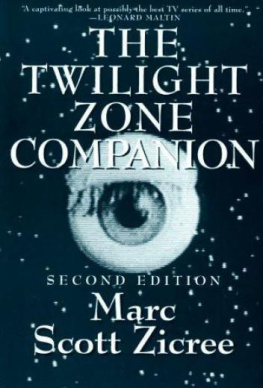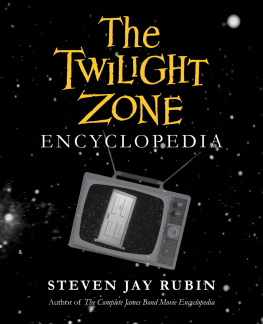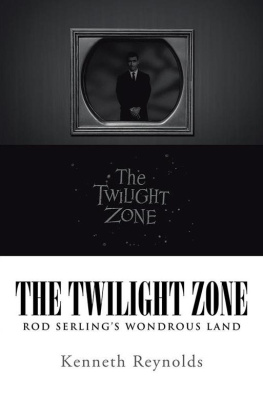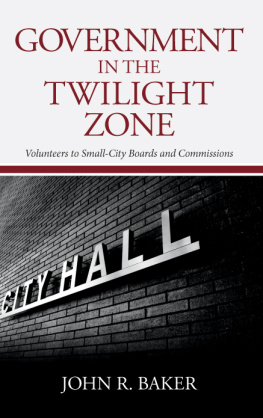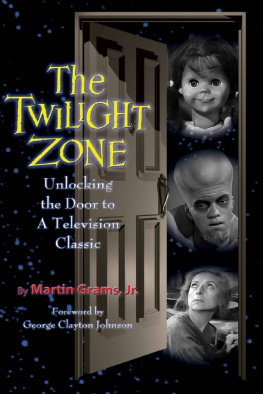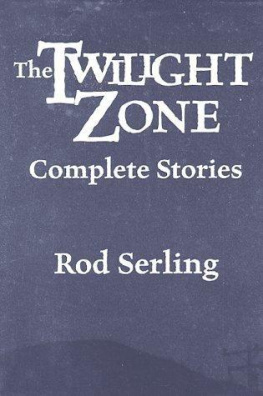Marc Scott Zicree - Twilight Zone Companion
Here you can read online Marc Scott Zicree - Twilight Zone Companion full text of the book (entire story) in english for free. Download pdf and epub, get meaning, cover and reviews about this ebook. year: 1989, genre: Detective and thriller. Description of the work, (preface) as well as reviews are available. Best literature library LitArk.com created for fans of good reading and offers a wide selection of genres:
Romance novel
Science fiction
Adventure
Detective
Science
History
Home and family
Prose
Art
Politics
Computer
Non-fiction
Religion
Business
Children
Humor
Choose a favorite category and find really read worthwhile books. Enjoy immersion in the world of imagination, feel the emotions of the characters or learn something new for yourself, make an fascinating discovery.
- Book:Twilight Zone Companion
- Author:
- Genre:
- Year:1989
- Rating:3 / 5
- Favourites:Add to favourites
- Your mark:
- 60
- 1
- 2
- 3
- 4
- 5
Twilight Zone Companion: summary, description and annotation
We offer to read an annotation, description, summary or preface (depends on what the author of the book "Twilight Zone Companion" wrote himself). If you haven't found the necessary information about the book — write in the comments, we will try to find it.
Twilight Zone Companion — read online for free the complete book (whole text) full work
Below is the text of the book, divided by pages. System saving the place of the last page read, allows you to conveniently read the book "Twilight Zone Companion" online for free, without having to search again every time where you left off. Put a bookmark, and you can go to the page where you finished reading at any time.
Font size:
Interval:
Bookmark:
THE TWILIGHT ZONE COMPANION
BY MARC SCOTT ZICREE
INTRODUCTION
I
If youve bought this book, or if youre reading this introduction in a bookstore, you are reading it for one reason and one reason only: Rod Serlings The Twilight Zone entertained you, touched you, and left its mark. You are not alone in this. During its original five-year run on CBS from 1959 to 1964, The Twilight Zone attracted an average weekly audience of close to eighteen million people, and since then the numbers that have watched it in syndication have added countless millions more.
When The Twilight Zone debuted in 1959, it was a flower blooming in a television desert, made vacant by an endless number of situation comedies, westerns, and cop shows. To its faithful viewers, The Twilight Zone offered far more than empty laughs or a lesson in urban or frontier justice. Instead, at its best, it lived up to the promise of its opening narration, revealing a vista of realities not weighed down by the merely probable. At a time when the rest of television was hammering home the unstated but nonetheless apparent message that the realities and expectations of life were bracketed within very narrow borders, The Twilight Zone presented a universe of possibilities and options. Most importantly, with few exceptions the characters inhabiting The Twilight Zone were average, ordinary people: bank clerks, teachers, petty hoods, salesmen, executives on the rise or decline. It took no great leap for us to identify ourselves with these frail and vulnerable souls and imagine that perhaps in some flight of fancy, some slight tangent from the reality of the ordinary routine, what happened to these characters might very well happen to us.
In the next several hundred pages, we will look behind the magicians curtain, peek into the top hats and under the tables, and learn all the secrets. With minor magic tricks, revelation brings only disappointment, but with luck, examination of The Twilight Zones grander wizardry will bring greater understanding and appreciation of the intricacies behind the art. The first object of our scrutiny will be the Grand Sorcerer of the Twilight Zone himself, master of ceremonies and principal sleight-of-hand artist. Ladies and gentlemen Mr. Rod Serling.
ROD SERLING
I
If the name Rod Serling were to pop up in some nationwide word association test, virtually everyone in America would venture the automatic response, The Twilight Zone such is the degree to which Serlings name is attached to his creation. But during the 1950s, prior to The Twilight Zone, Serlings name summoned up references of an entirely different nature. He was counted one of a small, elite group of young and innovative writers, among them Paddy Chayefsky and Reginald Rose, whose works were defining television as a dramatic art form, one with a realism surpassing movies and an immediacy rivalling the stage. To public and press alike, Serling was viewed as videos equivalent of Arthur Miller or Tennessee Williams. One commentator even compared him to Sophocles.
Given this, it came as quite a shock when Serling announced in 1959 that he was going to devote all his energies to a weekly series of science-fiction and fantasy stories.
To go from writing an occasional drama for Playhouse 90, a distinguished and certainly important series, to creating and writing a weekly, thirty-minute television film, he conceded, was like Stan Musial leaving St. Louis to coach third base in an American Legion little league.
Worse than the change in length, however, was the seemingly 180-degree shift in subject matter. It was as though Serling were saying that he was going to stop commenting on the human condition and go play in a field of daisies. To many, science fiction was considered three notches below grafitti in terms of literary importance. During an interview with Serling on September 22, 1959, TV newsman Mike Wallace said, .. youre going to be, obviously, working so hard on The Twilight Zone that, in essence, for the time being and for the foreseeable future, youve given up on writing anything important for television, right?
At the time, Serlings harshest critics made the assumption that The Twilight Zone was not only a step down but a choice made entirely out of the blue. To any astute observer, however, his decision should have come as no surprise, for it was a totally logical and predictable progression in his career. Like an Agatha Christie mystery, clues leading to Rod Serlings involvement in The Twilight Zone were sprinkled throughout his youth and early works.
Rodman Edward Serling was born in Syracuse, New York, on December 25, 1924 (I was a Christmas present that was delivered unwrapped, he later said). Shortly thereafter, Rod and his familyhis brother Robert, seven years his senior, and his parents, Samuel Lawrence Serling, a wholesale meat dealer, and Esther Cooper Serlingmoved to Binghamton, a small city in upstate New York where, throughout his childhood, Rods imagination and creativity were allowed to flourish.
He was about the greatest extrovert you could ever hope for, says Bob Serling, now a successful novelist (The Presidents Plane Is Missing). He was a good-looking kid and he knew it. Very popular, very articulate, very outspoken. He had no arroganceit was confidence. There was a hell of a difference.
We were fairly close as kids and we played together a hell of a lot, despite the seven-year difference. The two of us used to read Amazing Stories, Astounding Stories, Weird Talesall of the pulps. If we saw a movie together, wed come home and act it out, just for the two of us. Our bikes became airplanes with machine guns on them. We were always playing cowboys.
Rod was not bookish by any means; he was outgoing, enthusiastic, loved to be center stage. His mouth was hinged open like the front end of a steam shovel running amok, Bob Serling recalls. The big treat for the family was to drive from Binghamton to Syracuse, which was seventy miles away, and my father once tipped us off that nobody was to say a word from the start of the trip until Rod stopped talking. Now, in those days it took approximately two and a half hours to drive the seventy miles and, so help me, he never stopped talking from the time he got into the car to the time we arrived in Syracuse. My mother and father were in absolute hysterics. He must have been six or seven years old. He was in a world all by himself. Hed sing, hed act out dialogue, hed talk to us without waiting for answers. He just kept talking.
He was that way all through school, that I can remember. A class leader, always into dramatics. Hed try out for anything. There was some kind of compulsion in him to do something that nobody elsethe ordinary kidwouldnt do. And this included joining the paratroopers in World War II. He was a damn fool to do it.
The day he graduated high school, Rod enlisted in the U.S. Army 11th Airborne Division paratroopers. During basic training, he took up boxing for extra pay and privileges, winning seventeen out of eighteen bouts.
Following basic training, he was sent into combat in the Pacific. In 1945, while Rod was fighting in the Philippines, his father died of a heart attack at the age of fifty-two. When Rod was finally able to return to Binghamton, it was to a home lacking forever the security and stability he had known as a child.
Without World War II, there is no way of knowing whether or not Serling would have become a writer, but the war both broadened his experience and placed an emotional pressure on him that demanded catharsis. I had been injured with the paratroopers [a severe shrapnel wound in the wrist and knee requiring hospitalization] and I was bitter about everything and at loose ends when I got out of the service. I think I turned to writing to get it off my chest.
Upon his discharge from the Army in 1946, Rod enrolled at Antioch College in Yellow Springs, Ohio, on the G.I. Bill. I really didnt know what the hell I wanted to do with my life, but I went to Antioch because my brother [had gone] there. I majored in physical ed that first year because I was interested in working with kids. But physical education couldnt fill the pressing need he had for self-expression. He soon changed his major to language and literature. During the war he had written scripts for Armed Services Radio, as well as lots of bad poetry. Now radio seemed the ideal medium. He became manager of the Antioch Broadcasting Systems radio workshop and wrote, directed and acted in weekly, full-scale productions which were broadcast over radio WJEM, Springfield. During the 1948-49 school year, the entire output of the workshop was written by Serling, and, with the exception of one adaptation, all the scripts were entirely original. Later, he would call this work pretty bad stuff, adding, Style is something you develop by copying the style of someone who writes well. For a while youre a cheap imitation. I was a Hemingway imitator. Everything I wrote began, It was hot. However, he was getting invaluable training and discipline, plus his first taste of practical business matters: every script he wrote he mailed out to at least one national radio show for consideration.
Next pageFont size:
Interval:
Bookmark:
Similar books «Twilight Zone Companion»
Look at similar books to Twilight Zone Companion. We have selected literature similar in name and meaning in the hope of providing readers with more options to find new, interesting, not yet read works.
Discussion, reviews of the book Twilight Zone Companion and just readers' own opinions. Leave your comments, write what you think about the work, its meaning or the main characters. Specify what exactly you liked and what you didn't like, and why you think so.

